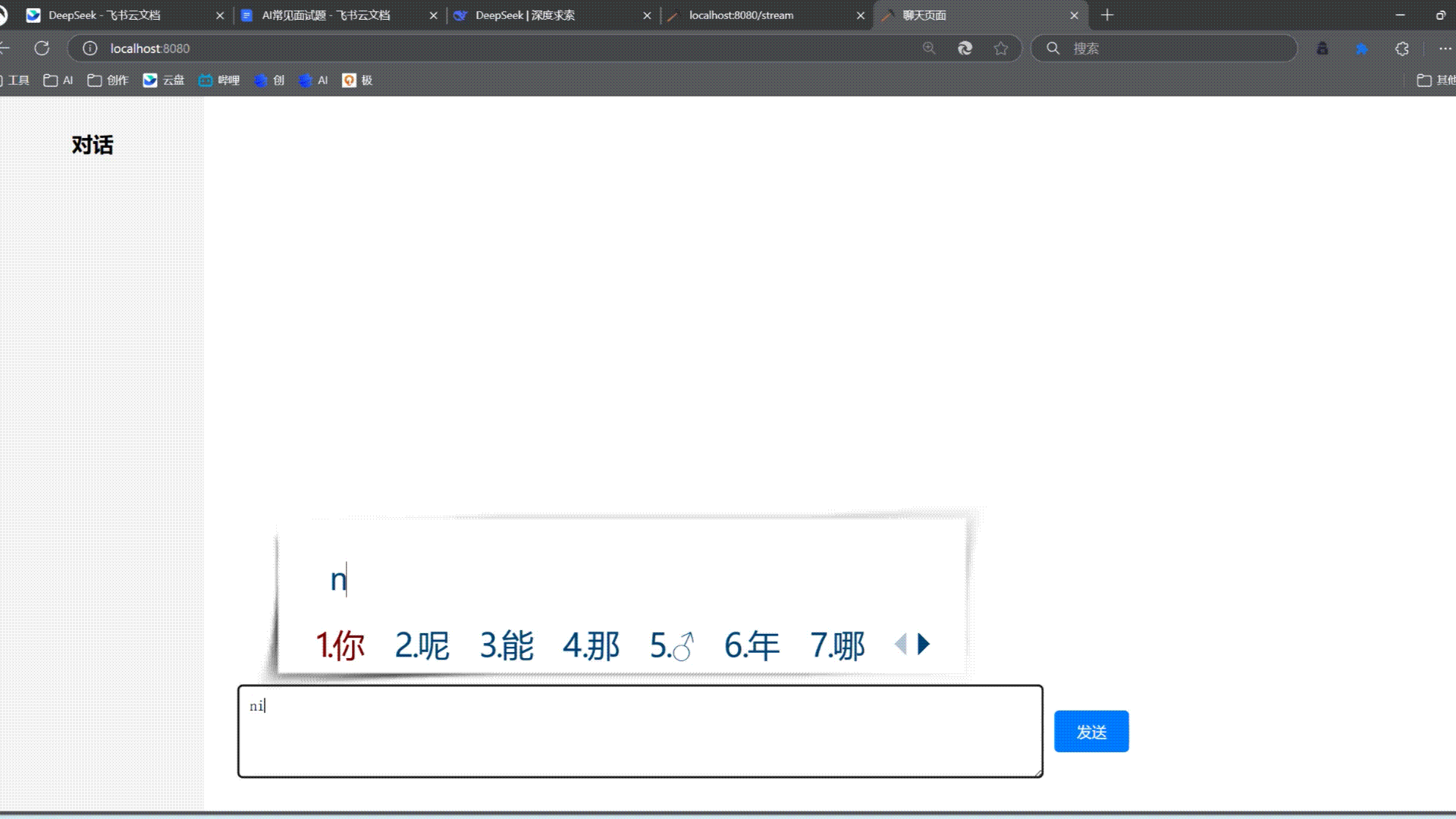前面一篇文章我们实现了《炸裂:SpringAI内置DeepSeek啦!》,但是大模型的响应速度通常是很慢的,为了避免用户用户能够耐心等待输出的结果,我们通常会使用流式输出一点点将结果输出给用户。
那么问题来了,想要实现流式结果输出,后端和前端要如何配合?后端要使用什么技术实现流式输出呢?接下来本文给出具体的实现代码,先看最终实现效果:

解决方案
在 Spring Boot 中实现流式输出可以使用 Sse(Server-Sent Events,服务器发送事件)技术来实现,它是一种服务器推送技术,适合单向实时数据流,我们使用 Spring MVC (基于 Servlet)中的 SseEmitter 对象来实现流式输出。
具体实现如下。
1.后端代码
Spring Boot 程序使用 SseEmitter 对象提供的 send 方法发送数据,具体实现代码如下:
java
import org.springframework.http.MediaType;
import org.springframework.web.bind.annotation.GetMapping;
import org.springframework.web.bind.annotation.RestController;
import org.springframework.web.servlet.mvc.method.annotation.SseEmitter;
@RestController
public class StreamController {
@GetMapping(value = "/stream", produces = MediaType.TEXT_EVENT_STREAM_VALUE)
public SseEmitter streamData() {
// 创建 SSE 发射器,设置超时时间(例如 1 分钟)
SseEmitter emitter = new SseEmitter(60_000L);
// 创建新线程,防止主程序阻塞
new Thread(() -> {
try {
for (int i = 1; i <= 5; i++) {
Thread.sleep(1000); // 模拟延迟
// 发送数据
emitter.send("time=" + System.currentTimeMillis());
}
// 发送完毕
emitter.complete();
} catch (Exception e) {
emitter.completeWithError(e);
}
}).start();
return emitter;
}
}2.前端代码
前端接受数据流也比较简单,不需要在使用传统 Ajax 技术了,只需要创建一个 EventSource 对象,监听后端 SSE 接口,然后将接收到的数据流展示出来即可,如下代码所示:
html
<!DOCTYPE html>
<html>
<head>
<title>流式输出示例</title>
</head>
<body>
<h2>流式数据接收演示</h2>
<button onclick="startStream()">开始接收数据</button>
<div id="output" style="margin-top: 20px; border: 1px solid #ccc; padding: 10px;"></div>
<script>
function startStream() {
const output = document.getElementById('output');
output.innerHTML = ''; // 清空之前的内容
const eventSource = new EventSource('/stream');
eventSource.onmessage = function(e) {
const newElement = document.createElement('div');
newElement.textContent = "print -> " + e.data;
output.appendChild(newElement);
};
eventSource.onerror = function(e) {
console.error('EventSource 错误:', e);
eventSource.close();
const newElement = document.createElement('div');
newElement.textContent = "连接关闭";
output.appendChild(newElement);
};
}
</script>
</body>
</html>3.运行项目
运行项目测试结果:
- 启动 Spring Boot 项目。
- 在浏览器中访问地址 http://localhost:8080/index.html,即可看到流式输出的内容逐渐显示在页面上。
4.最终版:流式输出
后端代码如下:
java
import org.springframework.ai.chat.messages.UserMessage;
import org.springframework.ai.chat.prompt.Prompt;
import org.springframework.ai.openai.OpenAiChatModel;
import org.springframework.beans.factory.annotation.Autowired;
import org.springframework.web.bind.annotation.GetMapping;
import org.springframework.web.bind.annotation.RequestParam;
import org.springframework.web.bind.annotation.RestController;
import org.springframework.web.servlet.mvc.method.annotation.SseEmitter;
import java.util.Map;
@RestController
public class ChatController {
private final OpenAiChatModel chatModel;
@Autowired
public ChatController(OpenAiChatModel chatModel) {
this.chatModel = chatModel;
}
@GetMapping("/ai/generate")
public Map generate(@RequestParam(value = "message", defaultValue = "你是谁?") String message) {
return Map.of("generation", this.chatModel.call(message));
}
@GetMapping("/ai/generateStream")
public SseEmitter streamChat(@RequestParam String message) {
// 创建 SSE 发射器,设置超时时间(例如 1 分钟)
SseEmitter emitter = new SseEmitter(60_000L);
// 创建 Prompt 对象
Prompt prompt = new Prompt(new UserMessage(message));
// 订阅流式响应
chatModel.stream(prompt).subscribe(response -> {
try {
String content = response.getResult().getOutput().getContent();
System.out.print(content);
// 发送 SSE 事件
emitter.send(SseEmitter.event()
.data(content)
.id(String.valueOf(System.currentTimeMillis()))
.build());
} catch (Exception e) {
emitter.completeWithError(e);
}
},
error -> { // 异常处理
emitter.completeWithError(error);
},
() -> { // 完成处理
emitter.complete();
}
);
// 处理客户端断开连接
emitter.onCompletion(() -> {
// 可在此处释放资源
System.out.println("SSE connection completed");
});
emitter.onTimeout(() -> {
emitter.complete();
System.out.println("SSE connection timed out");
});
return emitter;
}
}前端核心 JS 代码如下:
javascript
$('#send-button').click(function () {
const message = $('#chat-input').val();
const eventSource = new EventSource(`/ai/generateStream?message=` + message);
// 构建动态结果
var chatMessages = $('#chat-messages');
var newMessage = $('<div class="message user"></div>');
newMessage.append('<img class="avatar" src="/imgs/user.png" alt="用户头像">');
newMessage.append(`<span class="nickname">${message}</span>`);
chatMessages.prepend(newMessage);
var botMessage = $('<div class="message bot"></div>');
botMessage.append('<img class="avatar" src="/imgs/robot.png" alt="助手头像">');
// 流式输出
eventSource.onmessage = function (event) {
botMessage.append(`${event.data}`);
};
chatMessages.prepend(botMessage);
$('#chat-input').val('');
eventSource.onerror = function (err) {
console.error("EventSource failed:", err);
eventSource.close();
};
});以上代码中的"$"代表的是 jQuery。
本文已收录到我的面试小站 www.javacn.site,其中包含的内容有:DeepSeek、场景题、并发编程、MySQL、Redis、Spring、Spring MVC、Spring Boot、Spring Cloud、MyBatis、JVM、设计模式、消息队列等模块。